CUHK experts and researchers across disciplines have been devoted to tackling challenges brought by COVID-19 with innovative research and development. Know more about the latest discoveries.
-
Researchers from the School of Public Health, LKS Faculty of Medicine of The University of Hong Kong (HKUMed), in collaboration with The Chinese University of Hong Kong’s (CUHK) Faculty of Medicine (CU Medicine), discovered a causal link between smoking and a higher risk of contracting mild to severe COVID-19, using data from large scale genome-wide association studies. The findings have been published in Addiction, a leading peer-reviewed substance use journal.

-
A study led by The Chinese University of Hong Kong’s (CUHK) Faculty of Medicine (CU Medicine) and the LKS Faculty of Medicine, The University of Hong Kong (HKUMed) provides new insight into how coronavirus SARS-CoV-2 triggers severe inflammation in human blood vessels. They discovered that SARS-CoV-2 can induce endothelial inflammation through activation of a unique cell surface receptor, toll-like receptor (TLR) 4, without entering the host cell. The findings have been published in Stem Cell Reports.

-
Post-acute COVID-19 syndrome, more commonly known as “long COVID”, is characterised by complications and/or persistent symptoms weeks and months after COVID-19 infection. A new study conducted by the Faculty of Medicine at The Chinese University of Hong Kong (CU Medicine) showed that the gut microbiome composition may be linked to a person’s risk of developing long COVID many months after their initial infection with COVID-19.
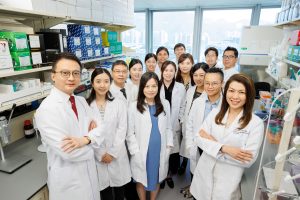
-
The Centre for Gut Microbiota Research of the Faculty of Medicine at The Chinese University of Hong Kong (CU Medicine) is among the first in the world to discover that germs in our gut (gut microbiota) modulate our immunity and disease severity in COVID-19. In a collaborative research project between CU Medicine and the LKS Faculty of Medicine at The University of Hong Kong (HKUMed), the research team showed that the efficacy of SinoVac and BioNTech correlated with a unique bacterium, Bifidobacterium adolescentis. They found that people who lacked Bifidobacterium adolescentis in their gut had a suboptimal antibody response to SinoVac. Among BioNTech recipients, those who lacked two types of bacteria including Bifidobacterium adolescentis also had lower antibody response. These novel findings imply that Bifidobacterium adolescentis can serve as a potential therapeutic option to enhance efficacy of SinoVac and BioNTech.

-
Acute kidney injury is common in critically ill COVID-19 patients, with more than 40% of those who needed intensive care developed this complication. CU Medicine has recently discovered that the N protein of SARS-CoV-2 is pathogenic and it can induce acute kidney injury by interacting with a signaling molecule named Smad3. When Smad3 is inhibited, the interaction will be prevented. Thus, Smad3 inhibitor can be a novel treatment for COVID-19 associated acute kidney injury.

-
To ensure the accuracy and consistency of diagnostic tests for COVID-19 is an important aspect in effective disease control. The Faculty of Medicine at The Chinese University of Hong Kong systematically evaluated the performance of three common nucleic acid tests, namely digital Polymerase Chain Reaction (dPCR), quantitative Polymerase Chain Reaction (qPCR), and loop-mediated isothermal amplification (LAMP), for the diagnosis of COVID-19 in hospital and clinics. Results demonstrated that though dPCR is the most sensitive type of test, followed by qPCR, and then LAMP, there was no significant difference in the accuracy or consistency among the three types of test. Instead, researchers found that the specimen types and RNA extraction methods should be the focus in optimising the tests performance.
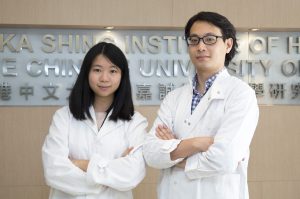
-
A research study by Professor Samuel Wong, School Director, and Professor Kwok Kin-on of JC School of Public Health and Primary Care of The Chinese University of Hong Kong revealed that nearly 80% parents were not likely to accept COVID-19 vaccination for their child. Research showed that parents were less likely to accept COVID-19 vaccination for their child (21.2%) than for themselves (36.1%).

-
A survey conducted by the Faculty of Medicine at The Chinese University of Hong Kong shows that only 1 in 4 unvaccinated people are prepared to receive the jabs in the coming six months. The majority of respondents do not agree that the government should use cash to boost vaccination rate, while multiple incentives, including the relaxation of quarantine and social distancing requirements, as well as travel permit, are needed. Researchers suggest strengthening public education and information dissemination, for example by engaging doctors more extensively to promote vaccination.
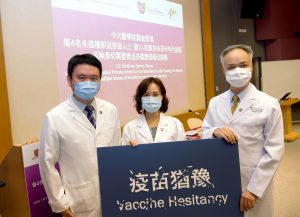
-
A COVID-19 hidden infection study conducted by the Faculty of Medicine at The Chinese University of Hong Kong estimates that about 20,000 people at most in Hong Kong were infected with the virus but unidentified. Adding in 10,000-plus confirmed cases, the research team summed up that over 99% of the Hong Kong population will have to rely on vaccination to establish protection against COVID-19 infection.
Another study confirmed that all participants who had received two doses of vaccines, regardless of the brand, successfully developed neutralising antibody, meaning both vaccines available in Hong Kong are effective to provide protection. Under the threat of the continuous outbreak in neighbouring areas, and the emergence of new strains, researchers urge citizens in Hong Kong to get vaccinated as early as possible to lower the risk of infection and spread of the virus.

-
Liver injury is commonly observed in COVID-19 patients, either in the form of hepatitis, cholestasis, or both. This has raised concerns if COVID-19 would lead to worse clinical outcomes in patients with chronic liver diseases, particularly in the Asia-Pacific region where almost 7% of the estimated 5 billion people living in this region have chronic hepatitis B virus (HBV) infection.
A research team of the Faculty of Medicine at The Chinese University of Hong Kong has analysed data from over 5,000 COVID-19 patients (including 353 current HBV infections and 359 past HBV infections) in Hong Kong. The results showed that the liver biochemistries of COVID-19 patients changed dynamically during the clinical course, yet there was no obvious difference between COVID-19 patients with current, past, and no HBV infection. On the other hand, acute liver injury was shown to be independently associated with mortality in COVID-19 patients independent of HBV infection status. Although most COVID-19 therapies in patients with current and past HBV infection are generally safe, the team recommends that vigilant monitoring of liver biochemistries and HBV DNA, and cautious use of appropriate medications with least hepatotoxicity to minimize such liver injury. It could minimize the risk of HBV reactivation and acute liver injury.

-
A recent global study led by researchers from the Faculty of Medicine at The Chinese University of Hong Kong and the LKS Faculty of Medicine at The University of Hong Kong has discovered a hepatitis C virus drug “simeprevir” as a potent treatment for COVID-19, which can strongly suppress the replication of SARS-CoV-2. The combination of this drug with “remdesivir” can result in drug synergism and generate an even more effective outcome.
The team mentioned that simeprevir is by now the only antiviral drug that can target more than one SARS-CoV-2 protein, meaning it can still function even if one of the proteins becomes mutated. The drug has great therapeutic potential and with less chance to develop drug-resistant mutants.

-
To make timely assessment of vaccine effectiveness (VE) possible, a research team from The Jockey Club School of Public Health and Primary Care at the Faculty of Medicine of The Chinese University of Hong Kong has developed the in silico bioinformatics algorithms to predict VE before mass vaccination. This innovation enables real-time prediction for VE using virus genome to inform the policy makers as early as possible in the flu season for evaluating the vaccination scheme and for the allocation of medical resources. The latest finding from the team showed that genetic mismatch could explain 80% of the VE variations.

-
A multidisciplinary research team from the Department of Computer Science and Engineering, Faculty of Engineering and Department of Imaging and Interventional Radiology, Faculty of Medicine of The Chinese University of Hong Kong has developed an artificial intelligence (AI) system for the automated, rapid and accurate detection of COVID-19 infections in chest computed tomography (CT) images.

-
The Faculty of Medicine at The Chinese University of Hong Kong team and its counterparts, which include the Obstetrics and Gynaecology Department from eight public hospitals in Hong Kong (Prince of Wales Hospital, Queen Elizabeth Hospital, United Christian Hospital, Princess Margaret Hospital, Tuen Mun Hospital, Kwong Wah Hospital, Pamela Youde Nethersole Eastern Hospital and Queen Mary Hospital), participated in the study. The study showed that babies born to mothers who have recovered from COVID-19 infection have antibodies against the virus. The study also demonstrated that anti-SARS-CoV-2 Immunoglobulin G (IgG) concentrations in cord and maternal sera at delivery were highly correlated.

-
Faculty of Medicine at The Chinese University of Hong Kong has found that most toddlers infected with SARS-CoV2 virus do not have symptoms, but have a high viral load and a long duration of live viral shedding. Therefore, they may silently spread the infection in the community. Detection and prevention of SARS-CoV2 infection in children in Hong Kong should be properly addressed as face-to-face classes in schools will be gradually resumed after the Easter holidays. A stool test is an invasive and accurate method for diagnosis of infection. It is more feasible for young children compared with deep throat saliva method or combined nasal and throat swab. To cut off the hidden chain of virus transmission, CU Medicine suggests promoting the use of stool tests for community compulsory testing or daily COVID-19 testing of young children.

-
Faculty of Medicine at The Chinese University of Hong Kong has conducted a preliminary study in the laboratory using blood samples from individuals who have received the COVID-19 vaccine. The investigation showed that restoring the balance of gut microbiota could reduce inflammatory cytokines and enhance antibody level. The research team is now launching clinical trials to investigate the impact of modulation of gut microbiota in reducing vaccine-related adverse reactions and improving the efficacy of the COVID-19 vaccine.

-
Surgery should be delayed for seven weeks after a patient tests positive for COVID-19 – as operations carried out within six weeks after diagnosis are associated with increased risk of death, according to a new global study. Researchers discovered that patients are more than 2.5 times more likely to die after their operations, if performed within the six weeks window following a positive diagnosis for SARS-CoV-2.
45 doctors from the Department of Surgery and Department of Anaesthesia and Intensive Care at the Faculty of Medicine at The Chinese University of Hong Kong and the Hospital Authority in the New Territories East Cluster joined with more than 15,000 surgeons across the world as part of the COVIDSurg Collaborative to determine the optimal duration of planned delay before surgery in patients who have had SARS-CoV-2 infection. This research was led by experts at the University of Birmingham.

-
The Chinese University of Hong Kong has conducted an epidemiological study investigating the effect of vaccination on preventing COVID-19 resurgence. The results show that by administering vaccines with an effective rate of 75%, the physical distancing measures can be relaxed to varying degrees until herd immunity is achieved (the vaccination rate reaches about 64% in one year), for cities with medium population density.
-
Researchers from the Faculty of Medicine at The Chinese University of Hong Kong found that COVID-19 patients lack certain good bacteria known to regulate their immune system and the abnormal gut microbiota persists after clearance of the virus, which could contribute to lingering symptoms, known as “Long COVID”. The study results suggest gut microbiome may influence the severity of COVID-19 and clinical management not only should aim at clearing the virus but also restoring the abnormal gut microbiota. CU Medicine followed up with COVID-19 patients in Hong Kong and found that 80% of patients suffer from “Long COVID”. The findings underscore the importance to restore gut dysbiosis to boost immunity against the virus and hasten recovery.

-
A survey by the Faculty of Medicine at The Chinese University of Hong Kong shows the overall COVID-19 vaccine acceptance rate for Hong Kong adults was 37%, which is far lower than that of other countries (around 60 – 90%). Results also show that Government recommendation is the strongest driving force for acceptance. To enhance confidence in and acceptance of COVID-19 vaccine, Health Belief Model should be adopted to customise COVID-19 vaccine promotion and education for different groups. Hong Kong should set a goal of vaccine coverage of at least 70% through informed, voluntary vaccination for herd immunity protection.

-
A recent large scale study by Professor Liona Poon from the Department of Obstetrics and Gynaecology of the Faculty of Medicine at The Chinese University of Hong Kong and research team has confirmed that pregnant women with COVID-19 are at an increased risk of death and pneumonia compared to non-pregnant women who are also affected by COVID-19. The other study from the research team has further proven that pregnant COVID-19 patients are at higher risk of intubation and intensive care unit (ICU) admission compared to non-pregnant women with COVID-19.

-
The Chinese University of Hong Kong has recently developed a fully automated, low cost and rapid microrobotic diagnostic system with comparable sensitivity and specificity to clinical detection methods. The research team is now studying the application of this microrobotic system for multiple pathogens including the COVID-19.

-
A research team from the Faculty of Medicine at The Chinese University of Hong Kong has recently introduced the nasal strip test as a novel and sensitive method to detect SARS-CoV-2. The team obtained nasal epithelial lining fluid by nasal strip from approximately 40 hospitalised COVID-19 patients. The samples were then compared against standard sampling methods including pooled nasopharyngeal and throat swabs or deep throat saliva. Results showed that accuracy of nasal strip test for SARS-CoV-2 is comparable to standard tests and even out-performed saliva specimens, especially in paediatric subjects. Specimens collected by nasal strip are also stable at room temperature for 72 hours. These results suggest that the nasal strip is a superior tool for community-based surveillance testing since it is a low-risk method which can be easy to administer in subjects of a wide age-range.

-
Gut microbiota plays an important role in regulating immunity against infections. People who suffer from imbalance in gut microbiota (dysbiosis) are more susceptible to viral infection and other complications. An earlier study by the Faculty of Medicine of The Chinese University of Hong Kong has highlighted that severe gut dysbiosis exists in COVID-19 patients.

-
Outbreaks of COVID-19 have resulted in the dissemination of the virus in the community. A study conducted by The Jockey Club School of Public Health and Primary Care of the Faculty of Medicine at The Chinese University of Hong Kong showed that other than the infectiousness of the source, the physical setting where the infection was transmitted played a key role in the propagation of the virus in society. In the first two waves of the outbreak in Hong Kong, entertainment venues accounted for the highest number of local primary setting transmissions and were linked with the widest range of subsequent cascades of transmissions settings. This finding is critical for controlling the spread of COVID-19 in the community. The research team reported their results in the latest issue of The Lancet Regional Health – Western Pacific.
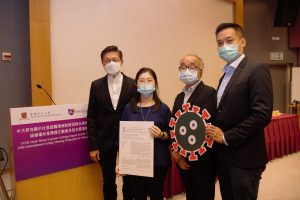
-
Professor Emily Chan, Director of the Collaborating Centre for Oxford University and CUHK for Disaster and Medical Humanitarian Response (CCOUC) and research team found that heavy reliance on informal home healthcare providers necessitates better understanding of their specific needs and increased government support services during public health emergencies.
-
With the scientific gaps in identifying effective vaccine and medical treatments against COVID-19 and health resources constraints, it is important to learn how non-pharmaceutical measures can be employed in the response to novel biological hazards and outbreaks. A study on the evidence for non-pharmaceutical measures against COVID-19 by using the WHO Health Emergency and Disaster Risk Management (Health-EDRM) framework was led by Professor Emily CHAN, Director of the Collaborating Centre for Oxford University and CUHK for Disaster and Medical Humanitarian Response (CCOUC). The narrative review identified and assessed 10 behavioural primary prevention measures against droplet-borne communicable diseases, including regular handwashing, wearing face masks, avoidance of utensil-sharing during meals and gatherings.

-
Faculty of Medicine at The Chinese University of Hong Kong published a research to analyse and compare data of 1,038 patients from the first and second waves of COVID-19 outbreak in Hong Kong.

-
Professor Jianfa Shen, Director, Research Centre for Urban and Regional Development, Hong Kong Institute of Asia-Pacific Studies examined the relationship between inter-provincial migration and the diffusion of COVID-19 outbreak in China. Statistical analysis shows that the migrants who moved into Hubei in 2010-2015 is a good indicator of the population flow from Hubei to other provinces that caused the spread of COVID-19 in early 2020.
-
Professor Connie Yuen, The Nethersole School of Nursing, Faculty of Medicine, The Chinese University of Hong Kong, Hong Kong and the research team conducted a study implying that apart from emphasizing the health hazards of a novel infectious disease, an effective public health intervention and crisis communication should address avoidance-based coping and self-efficacy of the public in adherence to precautionary measures for COVID-19.
-
Researchers from the Faculty of Medicine of The Chinese University of Hong Kong found for the first time that COVID-19 patients have active and prolonged gut viral infection, even in the absence of gastrointestinal (GI) symptoms. After respiratory clearance of coronavirus, the activity of viral infection and replication will still persist in the gut.

-
The research examines the experiences of people with non-communicable diseases (NCDs) and their relevant self-care patterns during the COVID-19 pandemic. Results showed that low household income and residence in government-subsidized housing were significant predictors for the subjects who experienced difficulty in managing during first 2 months of the pandemic. Targeted services for vulnerable groups during a pandemic should be explored to support NCD self-care.
-
Researchers from the Faculty of Medicine at The Chinese University of Hong Kong conducted a study on residential care homes in Hong Kong. Unlike outbreaks with high fatality rate in nursing homes or residential care settings reported in many European countries and the United States, no COVID-19 outbreak among residential care homes and no case had been reported among the residents.
-
Professor Emily Ying Yang CHAN from the CU Medicine’s Jockey Club School of Public Health and Primary Care is listed as a key expert in providing input for the World Health Organization’s global guidance for home care for COVID-19 patients, including the requirements for the household to be suitable for caring for COVID-19 patients in the home such as identifying a caregiver in the household, adequate information about COVID-19 and transmission prevention and adequate hand and respiratory hygiene supplies and environmental cleaning materials for caregivers and other household members, and availability of healthcare professionals responsible for supporting and following up the care.

-
The older population and those with dementia around the world are facing an unprecedented threat from COVID-19 which threatens them with a higher risk of death when infected. As of 23 August 2020, in Hong Kong, the mortality rate for people aged 60 or above was around 6.27%, which was almost 105 times of those below 60 (0.06%). All deaths from the third wave of COVID-19 in Hong Kong are 60 years old or above. Data from the United Kingdom showed that having dementia was associated with a two-fold increase in the risk of death from COVID-19. In light of this, a dementia team of the Faculty of Medicine at The Chinese University of Hong Kong, initiated an international effort to devise strategies that can reduce the adverse impact which can come from public health interventions and protect them from getting COVID-19.

-
CU Medicine research team has recently published a study report on COVID-19 tests and examined 563 samples collected from 50 COVID-19 patients to evaluate the diagnostic performance of deep-throat saliva.
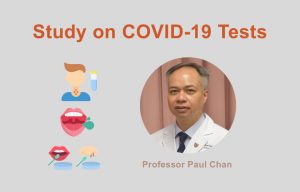
-
Researchers from the Faculty of Medicine at The Chinese University of Hong Kong have recently conducted a study to investigate the impact of liver injury on clinical outcomes in COVID-19 patients. Data from over 1,000 COVID-19 patients in Hong Kong was analysed and liver injury was found in around 20% of the patients. The estimated risk of COVID-19 patients with liver injury experiencing adverse clinical outcomes such as intensive care unit (ICU) admission, use of invasive mechanical ventilation or death was almost eight times of other patients. It is suggested that liver function monitoring is important regarding its association with adverse clinical outcomes in COVID-19 patients.

-
Dr Hon-Cheong So, Assistant Professor and researchers from the School of Biomedical Sciences of the Faculty of Medicine, CUHK have recently applied an advanced statistical approach to analyse risk factors that may be causally related to COVID-19 infection. Results suggested that diabetes may be a risk factor leading to increased susceptibility to or severity of COVID-19 infection through changes in ACE2 expression, which is a key receptor for the virus.

-
Professor Paul Kay Sheung Chan, Chairman of Department of Microbiology of CU Medicine, led the study to analyse data of the first 100 COVID-19 patients in Hong Kong. The study confirmed that there is a high risk of transmission among household members and ways to improve the effectiveness of home quarantine for persons coming back from high-risk areas shall be looked into. On the other hand, COVID-19 test should be made readily available to front line doctors in order to prevent the delay in diagnosis and containment.

-
The Faculty of Medicine at The Chinese University of Hong Kong has recently conducted a global survey to examine the impact of the COVID-19 pandemic on urological care. This is the world’s first survey of its kind and includes a large sample of urology professionals from 6 continents. Results from over 1,000 participants showed that on average 28% of urology outpatient clinics, 30% of outpatient investigations and procedures, and 31% of urological surgeries had a delay of more than 8 weeks. The degree of cut-down of urological services increased with the degree of COVID-19 outbreak.

-
The Faculty of Medicine of The Chinese University of Hong Kong is the first to discover a series of good bacteria missing in the gut of COVID-19 patients. The research team confirmed this discovery with a large number of healthy subjects and COVID-19 patients. Using big data analysis and machine learning, the research team has successfully developed a probiotic formula that aims to target gut dysbiosis, thereby offering hope of boosting immunity against COVID-19 and other emerging viral infections. They anticipate that the formula will soon be turned into a probiotic supplement to go with our daily diet to improve our defence against infection.

-
World Health Organization (WHO) has updated the interim guidance on the clinical management of COVID-19. This clinical document is intended for clinicians caring for COVID-19 patients during all phases of their disease (i.e. screening to discharge). It also promotes a multi-disciplinary approach to care for patients with COVID-19, including those with mild, moderate, severe, and critical disease. This guidance is written by a panel of international medical experts, including Professor David Hui (Department of Medicine and Therapeutics) and Professor Charles Gomersall (Department of Anaesthesia and Intensive Care) from the Faculty of Medicine of The Chinese University of Hong Kong.
-
Professor David Hui, Chairman, Department of Medicine and Therapeutics, Faculty of Medicine of The Chinese University of Hong Kong, and researchers from the US, Italy and Korea published a study on treating patients with severe COVID-19 with Remdesivir.
-
Professor Jianfa Shen, Director, Research Centre for Urban and Regional Development, Hong Kong Institute of Asia-Pacific Studies examined the relationship between the geographical, social and economic factors and the number of COVID-19 cases in China. Both correlation and regression analyses show that the migrants who moved into Hubei in 2005-2010 is a good indicator of the population flow from Hubei to other provinces that caused the spread of COVID-19 in early 2020.
-
The Asian Working Group for Sarcopenia summarized the considerations of Asian countries focusing on responses and difficulties in each country, impacts of health inequity related to the COVID‐19 pandemic and proposed recommendations for older people, which are germane to the Asian context. More innovative services should be developed to address the increasing demands for new approaches to deliver healthcare in these difficult times and to establish resilient healthcare systems for older people.
-
Yang, Y. (2020, March 26). How the Wuhan lockdown significantly cut COVID-19 infections? Retrieved from China Business Knowledge of the Faculty of Business Administration, The Chinese University of Hong Kong: https://cbk.bschool.cuhk.edu.hk/how-the-wuhan-lockdown-significantly-cut-infections/
Wu, J. (2020, May 7). COVID-19 and the Future of Chinese Manufacturing. Retrieved from China Business Knowledge of the Faculty of Business Administration, The Chinese University of Hong Kong: https://cbk.bschool.cuhk.edu.hk/covid-19-and-the-future-of-chinese-manufacturing/
-
Professor KF Ho of The Jockey Club School of Public Health and Primary Care of The Chinese University of Hong Kong and researchers from Mainland China and Hong Kong published a study that revealed hotspots for airborne SARS-CoV-2 RNA, but whether this material has the potential to infect was not assessed.
-
Professor Liona Poon, Department of Obstetrics and Gynaecology, Faculty of Medicine of The Chinese University of Hong Kong took part in a large scale study based on 116 cases of coronavirus disease 2019 in pregnant women from 25 hospitals. Severe acute respiratory syndrome coronavirus 2 infection during pregnancy is not associated with an increased risk of spontaneous abortion and spontaneous preterm birth. There is no evidence of vertical transmission of severe acute respiratory syndrome coronavirus 2 infection when the infection manifests during the third trimester of pregnancy.

-
Professor Kin-on Kwok, Assistant Professor of The Jockey Club School of Public Health and Primary Care, Faculty of Medicine of The Chinese University of Hong Kong and the team interviewed with over 1,700 respondents online during the early phase of the coronavirus disease epidemic in Hong Kong. The team discovered that most respondents were alert to the disease progression of COVID-19 and adopted self-protective measures due to the high levels of risk perception regarding COVID-19.
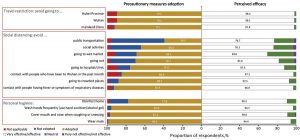
-
The study explored emergency nurses’ behaviours and strategies in handling uncertainty and practice changes during an epidemic event. Adapting protocol to the evolving context of practice was revealed as the core category. Four interplaying subcategories were identified: (1) Completing a comprehensive assessment, (2) continuing education for emerging infectious disease management, (3) incorporating guideline updates and (4) navigating new duties and competencies.
-
The study explored emergency nurses’ perceptions regarding the risk appraisal of the threat of the emerging infectious disease situation in emergency department context. The information may help to predict the attitudes and behaviours of emergency nurses in future impending epidemic events, enhancing emergency nurses’ preparedness towards in such situations.
-
